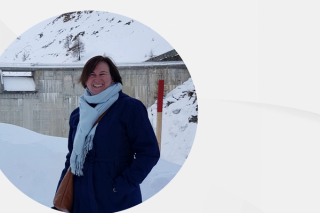
Women in STEM: A Q&A with Lesa Delaere – Water Resources Advisor
- Post Date
- 14 January 2023
- Read Time
- 5 minutes

Ada Lovelace Day – celebrated on the 12th of October - is an international celebration of the achievements of women in science, technology, engineering, and maths (STEM). It aims to increase the profile of women in STEM and, in doing so, create new role models who will encourage more girls into STEM careers and support women already working in STEM.
Fittingly, we’ve interviewed a few of the exceptional women at SLR to understand more about their roles, their journey, and to share some inspiration for younger generations. Today, we’re introducing Lesa Delaere, who is a Technical Director for the Water Resources team based in Brisbane, Australia.
Tell me a bit about your job?
My role is a water resources advisor. It brings together the field of engineering with other disciplines and considerations for the development of water infrastructure. For example, environment and social sciences, economics, land and development, cultural heritage and native title, and many others. It seeks to create holistic solutions.
What influenced your decision to pursue your career?
I was a late bloomer to engineering. I was in my late 20s and was working for a defence engineering design company. They were working on Australia’s Collins Class fleet of submarines and talking with the engineers was always interesting.
I was also dating an engineer at the time, who on a date (believe it or not), explained the forces on the Sydney Harbour Bridge and how it all worked. I can tell you it’s not obvious, but when you know, it’s super cool.
Then, when I was considering university, it was only because my then husband told me I was smart enough that I even tried to enter engineering. I got in, and the rest is history.
Definitely not your typical date conversation! Do you think you knew much about engineering when you were a child?
Absolutely nothing. In a small country town, where I grew up, engineering was the local fitter and turner who fixed tractors and other machinery. It was not until well into adulthood that I was exposed to STEM, had an understanding of what it was, and was encouraged to do it.
Once you got started, did you ever experience any uncertainty that this was the right path for you?
All the time… and every day and still ask myself what I want to be when I grow up!
As a female in a male dominated industry (dams engineering), I was the only female in my work team for years. As an alternate thinker and communicator, I have different skills to those technical people you see on shows like Big Bang Theory. If you have heard of, or experienced ‘imposter syndrome’, you will have a good understanding of what I mean.
So many people are affected by imposter syndrome, but it’s discussed very little. It’s important to hear someone so established in their career as yourself discuss it sincerely.
Do you think there’s any big misconceptions about your job?
That if you are good at maths and science, you should be an engineer. Certainly, there is a place to those skills and a place for people who are technically minded. However, people live in the world and use the things engineers create, so it is equally important that other skills and experience are bought into the profession.
And would you say there’s a typical day in your role?
Often the days are filled with emails and other forms of communication. I respond to client requests for a proposal to undertake work, I perform that work (either as a study or design or field work) and usually write a report to document it.
There are also lots of meetings to collaborate with others. This brings together specialist skills and experience to enable an outcome that is safe, legally compliant, and works for the client. People think engineering is all fieldwork and yelling at someone on site, but that is really not the case.
What has your experience been as a woman studying and working in STEM? Have you faced any challenges?
Overall, I have been very well treated and accepted. I can honestly say that my career has been great. There have been challenges, mostly because I think differently to the men in charge and around me, and they often don’t get me! I have been asked to alter myself to fit to their culture and needs. That is a hard pill to swallow, particularly when the diversity rhetoric wants you to feel safe enough to bring your whole self to work. Now, I do bring my whole self. I think my years of experience have earned me the right to do just that.
In your opinion, what can the industry do to create a more positive environment that encourages more women to pursue STEM careers?
There are still some barriers to women, to engineers from other countries seeking work, to those with disabilities, and to those from disadvantaged backgrounds. We must get past the stereotypical engineer and paint engineering with the same society brush as society itself.
I think some re-branding is needed. Engineering is not what it was in the 1950s. We also need to be respectful - no yelling at someone on site, no bullying behaviour. These are persistent behaviours, primarily in the construction industry, and lead to poor mental health outcomes regardless of gender or background.
Lastly, what advice would you give to girls interested in a career in STEM?
Go for it. You are smart enough, you are talented enough, you are determined enough. It is a much more interesting career than law or dentistry (in my humble opinion).
-----------------------------------------------------------------------
We're posting a new interview each day this week. Read the rest of our Women in STEM series for Ada Lovelace Day:
Ghadeer Allaho - Project Geologist
Kimberley Tasker - Senior Ecologist
Leslie Cook Wong - Sustainable Consulting Leader
And to learn more about Ada Lovelace Day, visit findingada.com
Recent posts
-

-

Unlocking value through solar PV repowering: A focus on module replacement and DC/AC optimisation
by David Fernandez
View post -
